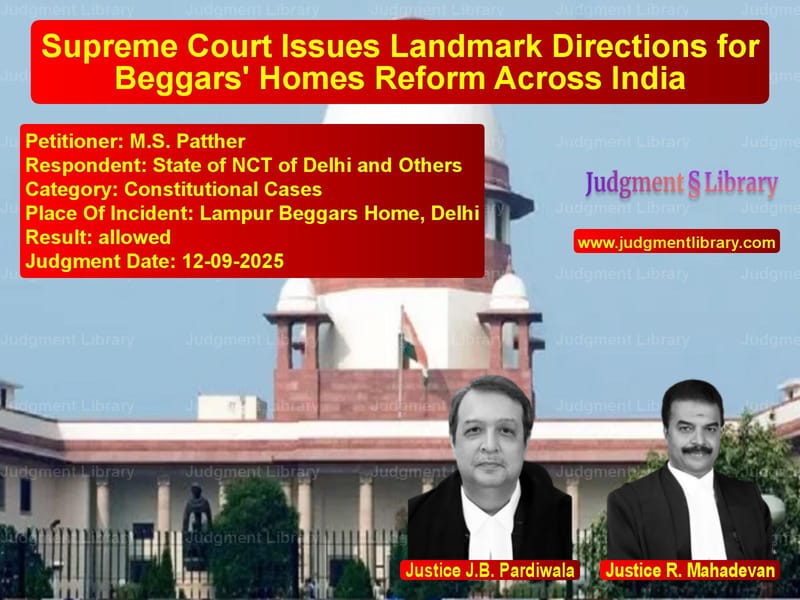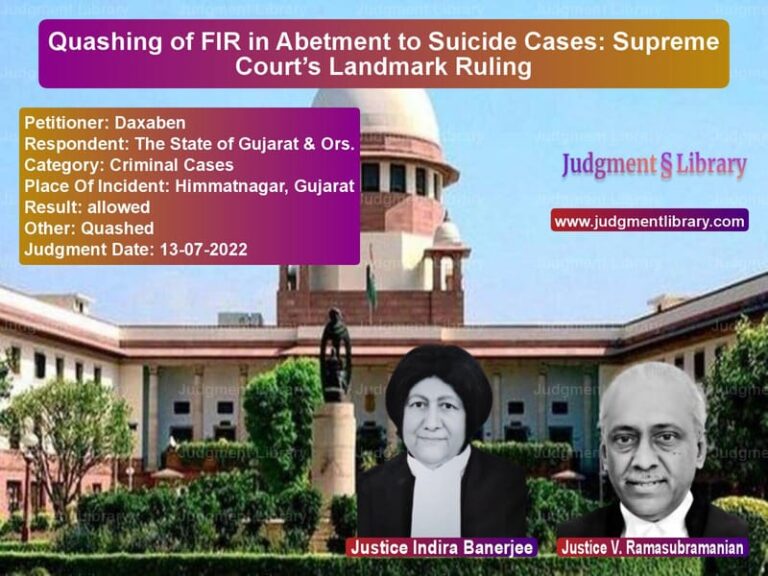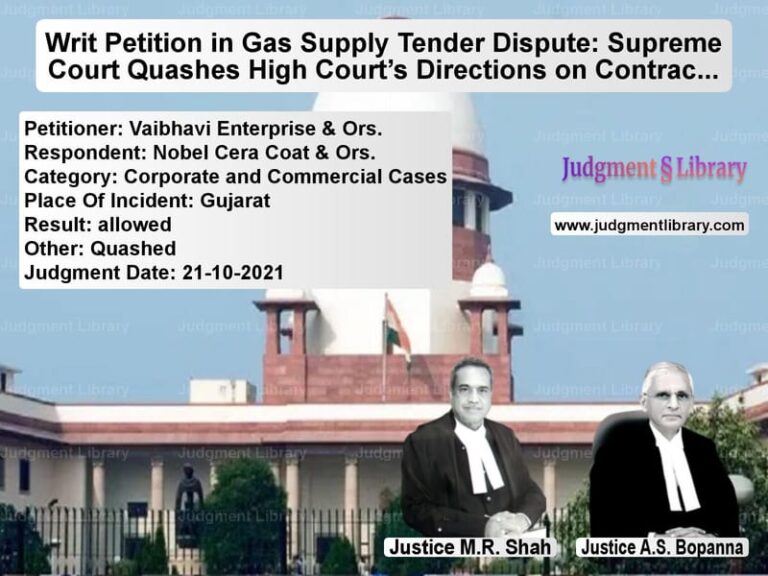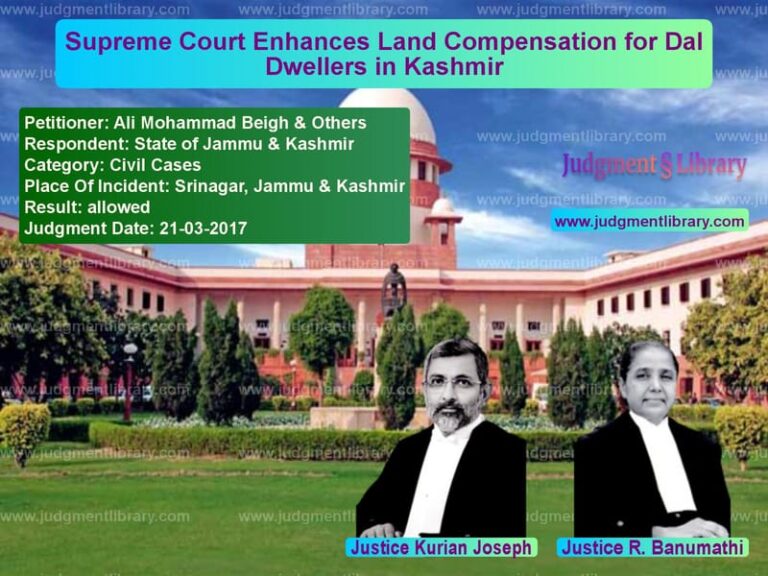Supreme Court Issues Landmark Directions for Beggars’ Homes Reform Across India
In a landmark judgment that reaffirms the constitutional right to life with dignity for society’s most vulnerable members, the Supreme Court of India has issued comprehensive directions for the reform and modernization of Beggars’ Homes across the country. The case, which originated from a tragic incident at the Beggars’ Home in Lampur, Narela, Delhi, where contaminated drinking water led to a cholera outbreak and multiple deaths in 2000, has culminated in a historic ruling that mandates fundamental changes in how society treats its indigent population.
The Supreme Court bench comprising Justice J.B. Pardiwala and Justice R. Mahadevan delivered a judgment that not only addresses the specific deficiencies in Delhi’s Beggars’ Homes but establishes a national framework for ensuring humane treatment, proper healthcare, and dignified living conditions for all residents of such institutions. The court’s ruling represents a significant shift from viewing beggars’ homes as punitive institutions to recognizing them as spaces of social justice and rehabilitation.
The case began when the appellant, M.S. Patther, filed a Public Interest Litigation after reading news reports in May 2000 about dozens of beggars suffering from cholera and gastroenteritis at the Beggars’ Home in Lampur. The reports indicated that multiple inmates had died due to contaminated water supply and inadequate medical care. The initial investigation revealed shocking conditions, including human excreta mixing with drinking water, non-functional chlorination plants, and gross negligence by authorities.
During the proceedings, the learned counsel for the appellant submitted that “the interim findings revealed shocking lapses, including human excreta mixing with drinking and cooking water, food unfit for human consumption, physical assaults on inmates and the use of ferocious dogs to terrorize inmates and force them to work in nearby private agricultural fields for the vested interests of caretakers and managing officers.”
The counsel further argued that “the committee also found officers absent or intoxicated during inspections and had sought more time for a thorough inquiry to fix responsibility and recommend remedies, which request was ignored by the High Court.”
On the other side, the learned counsel for the respondents submitted that “based on the special committee’s report relating to remedial measures in Beggars’ Homes, steps were taken from time to time and reports were filed by the respondents. The respondents are strictly following the provisions of the Begging Act and Rules.”
The Supreme Court’s judgment provides a profound constitutional analysis of the state’s responsibility toward indigent persons. The Court observed that “historically, the treatment of the indigent persons has oscillated between two diametrically opposed paradigms – criminalisation on the one hand and compassion on the other.”
The Court made a crucial distinction between colonial approaches and constitutional mandates, stating that “in contrast, the Indian Constitutional framework post – 1950 marks a decisive normative shift. The founding vision is explicitly welfare-centric, committed to dismantling structural inequalities and ensuring the dignity of every individual.”
In a powerful articulation of constitutional principles, the Court declared that “beggars’ homes cannot be conceived as quasi-penal facilities. Their role must be restorative, not retributive – places of recovery, skill-building, and reintegration into society. The term ‘home’ itself carries semantic and normative weight: it denotes safety, dignity, belonging, and care.”
The Court emphasized that “any arrangement that degenerates into a prison-like environment – characterised by overcrowding, unhygienic conditions, arbitrary or involuntary confinement, denial of medical treatment, neglect of mental health needs, or restrictions on personal liberty – is not merely a policy failure, but a constitutional infraction striking at the very heart of Article 21.”
Referring to its earlier jurisprudence, the Court recalled that “in Francis Coralie Mullin v. Administrator, Union Territory of Delhi, the Court held: ‘The right to life includes the right to live with human dignity and all that goes along with it, namely, the bare necessaries of life such as adequate nutrition, clothing and shelter…’ This judicial articulation leaves no doubt that the State’s responsibility towards indigent persons is affirmative and non-derogable.”
The Court made a significant observation about the heightened responsibility toward vulnerable populations, noting that “if such protections are owed to convicts and undertrials – individuals lawfully deprived of liberty pursuant to criminal conviction or prosecution – a fortiori, they must apply to residents of beggars’ homes, who are not offenders at all. Many are victims of structural poverty, mental illness, abandonment, domestic violence, caste discrimination, or social exclusion.”
After two decades of monitoring the case and issuing numerous interim directions, the Supreme Court has now laid down comprehensive guidelines that apply to all Beggars’ Homes across India. The directions cover eight critical areas: preventive healthcare and sanitation; infrastructure and capacity; nutrition and food safety; vocational training and rehabilitation; legal aid and awareness; child and gender sensitivity; accountability and oversight; and implementation and compliance.
Some of the key directives include mandatory medical screening within 24 hours of admission, monthly health check-ups, disease surveillance systems, infrastructure audits every two years, appointment of qualified dieticians, establishment of vocational training facilities, provision of legal aid, and constitution of monitoring committees.
The Court specifically directed that “in every case where the death of an inmate is attributed to negligence, lack of basic facilities, or failure to provide timely medical care: (a) the State / UT shall pay reasonable compensation to the next of kin of the deceased; and (b) initiate departmental and, where warranted, criminal proceedings against the officials found responsible.”
Importantly, the Court mandated that “children found begging shall not be detained in Beggars’ Homes but referred to child welfare institutions under the Juvenile Justice (Care and Protection of Children) Act, 2015.”
The judgment represents a paradigm shift in how society should approach poverty and homelessness. The Court emphasized that “the constitutional evaluation of beggars’ homes requires a paradigm shift – from viewing them as instruments of social control to recognising them as spaces of social justice. The failure to ensure humane conditions in such homes does not merely amount to maladministration; it represents a constitutional breach of the fundamental right to life with dignity, thereby inviting judicial intervention.”
The Court also directed the Union of India to “frame and notify model guidelines to facilitate uniform implementation of the aforesaid directions across all States and Union Territories” within three months, and gave all states and UTs six months to implement the directions.
This judgment comes at a crucial time when many states still operate under colonial-era begging prevention laws that criminalize poverty rather than addressing its root causes. The Supreme Court’s directions provide a roadmap for transforming these institutions from places of punishment to centers of compassion and rehabilitation, truly honoring the constitutional promise of dignity for all citizens, regardless of their economic status.
The ruling also serves as a powerful reminder that the measure of a society’s civilization is how it treats its most vulnerable members. By establishing clear standards for care, rehabilitation, and accountability, the Supreme Court has taken a significant step toward ensuring that poverty is not treated as a crime and that every individual, no matter how destitute, is guaranteed their fundamental right to live with dignity.
Petitioner Name: M.S. Patther.Respondent Name: State of NCT of Delhi and Others.Judgment By: Justice J.B. Pardiwala, Justice R. Mahadevan.Place Of Incident: Lampur Beggars Home, Delhi.Judgment Date: 12-09-2025.Result: allowed.
Don’t miss out on the full details! Download the complete judgment in PDF format below and gain valuable insights instantly!
Download Judgment: m.s.-patther-vs-state-of-nct-of-delh-supreme-court-of-india-judgment-dated-12-09-2025.pdf
Directly Download Judgment: Directly download this Judgment
See all petitions in Fundamental Rights
See all petitions in Public Interest Litigation
See all petitions in Judgment by J.B. Pardiwala
See all petitions in Judgment by R. Mahadevan
See all petitions in allowed
See all petitions in supreme court of India judgments September 2025
See all petitions in 2025 judgments
See all posts in Constitutional Cases Category
See all allowed petitions in Constitutional Cases Category
See all Dismissed petitions in Constitutional Cases Category
See all partially allowed petitions in Constitutional Cases Category







